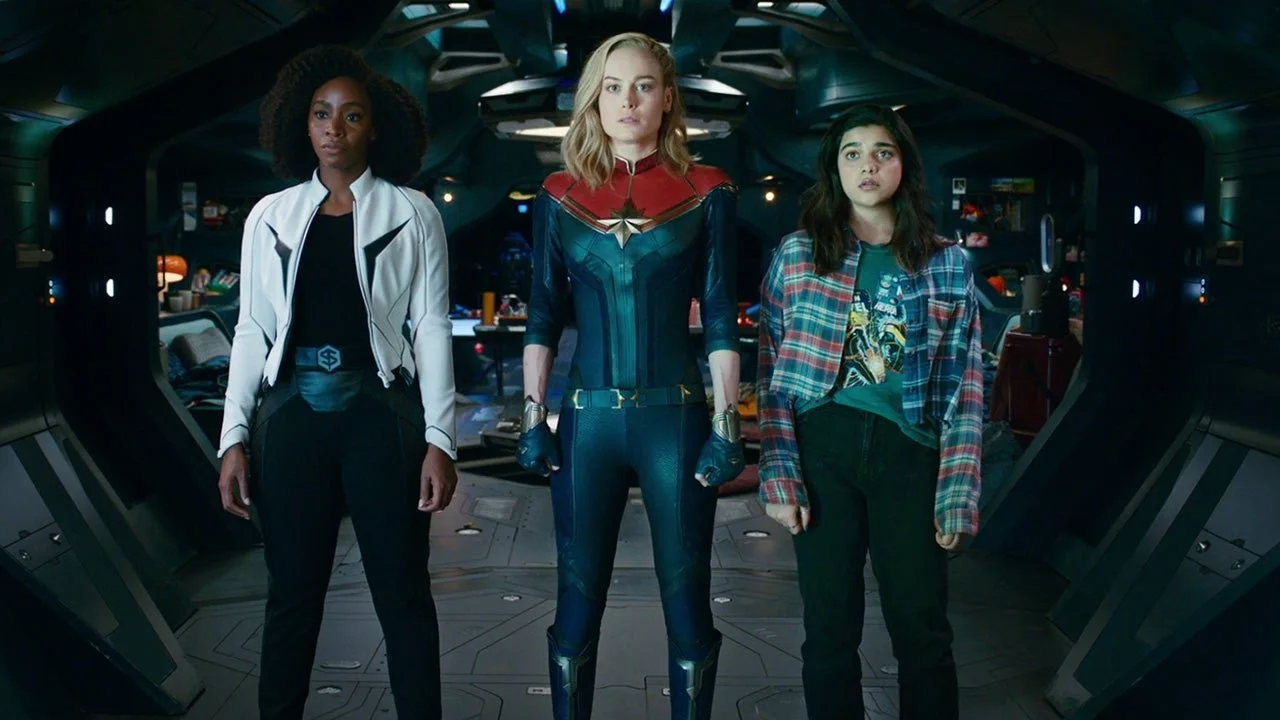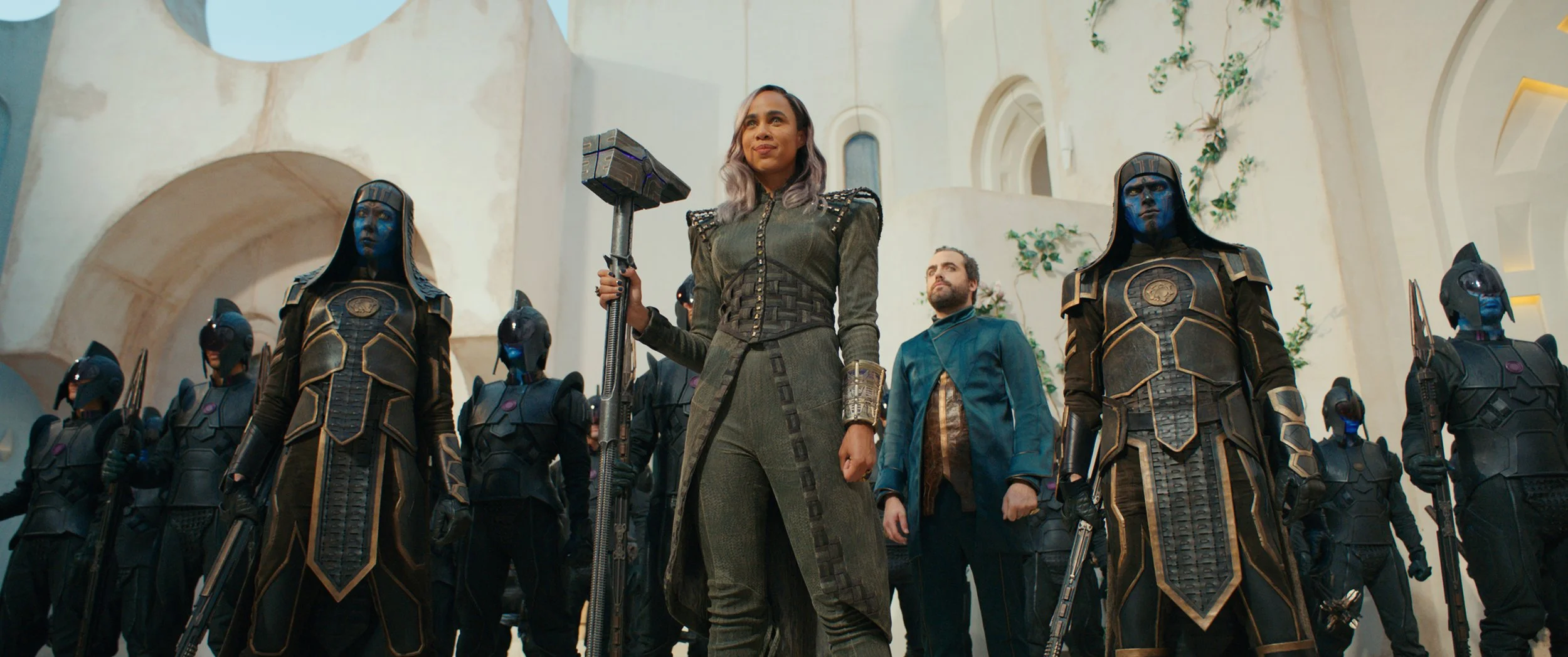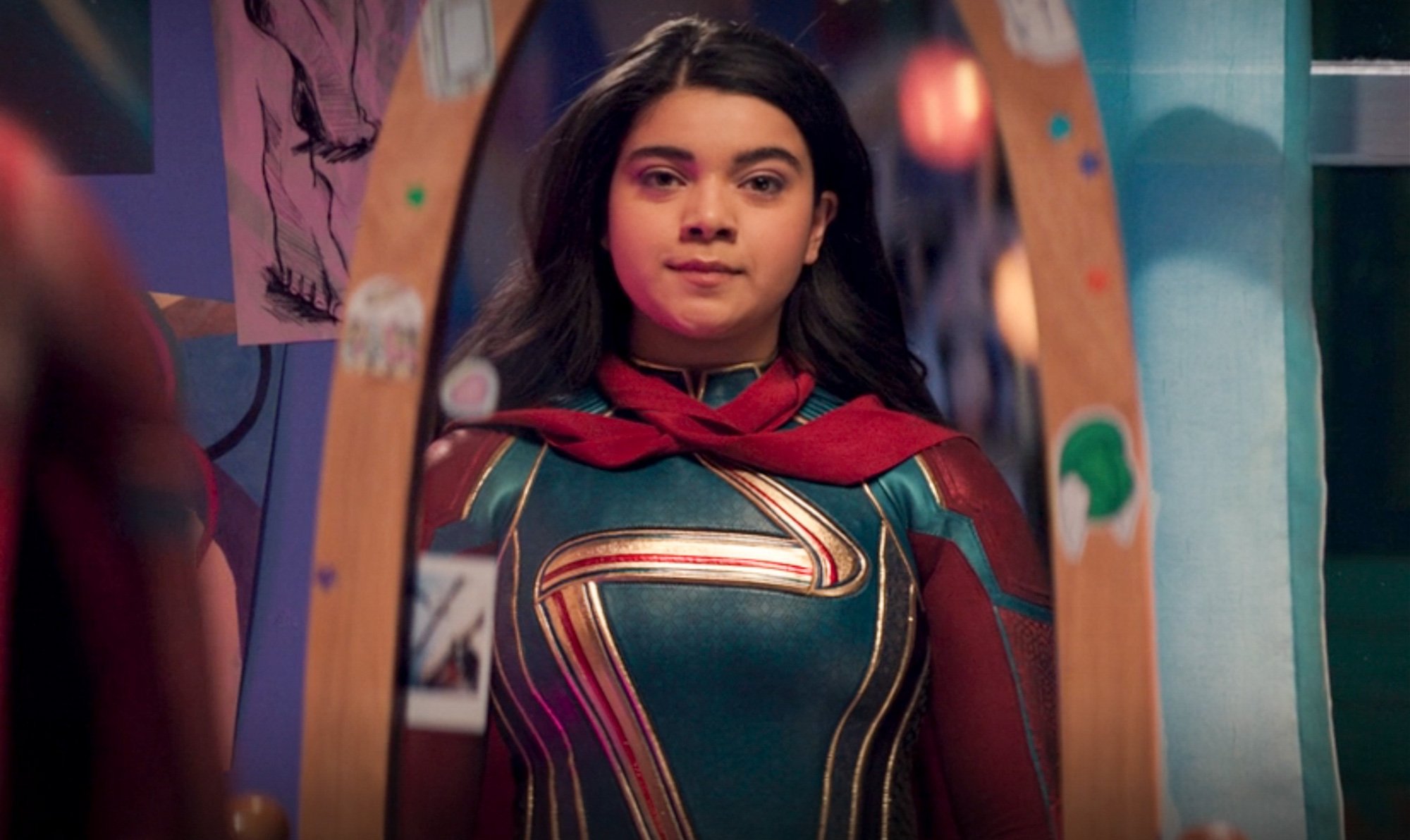The Marvels | Review
Marvel Studios is officially in its flop era. For over a decade, its films in the Marvel Cinematic Universe have reigned supreme, becoming the most successful franchise of all time (and it’s not even close). It did this by perfecting a formula where even its not-so-great films were at least good enough, avoiding the awful taste of superhero films from the early aughts. But the studio’s recent output over the last couple of years have yielded mixed results, from memorable highs like Black Panther: Wakanda Forever and Guardians of the Galaxy Vol. 3, to franchise lows like Thor: Love and Thunder and Ant-Man and the Wasp: Quantumania, and the myriad of okay-to-awful TV shows on Disney Plus, culminating in The Marvels, the sequel to the billion-dollar grosser Captain Marvel, which just debuted with the lowest box office opening weekend in the studio’s 15 year history and one of its most critically-panned. Oh how the mighty have fallen.
Marvel Studios is infamous for its heavy-handed approach to its films, where their in-house creative team—led by studio president Kevin Feige—have the final say. A couple directors have been able to craft great films in the MCU where their artistic voice is strong and apparent, like James Gunn and Ryan Coogler with the Guardians of the Galaxy and Black Panther films, respectively. Others, like Edgar Wright, Patty Jenkins, and Scott Derrickson, quit because they didn’t want to compromise their vision. But for most films in the MCU, the directors felt practically interchangeable because the films all felt like they were coming from the same corporate-mandated voice.
Monica Rambeau (Teyonah Parris), Carol Danvers (Brie Larson), and Kamala Khan (Iman Vellani)
But lately, the studio has become more interesting in its hiring, bringing back Sam Raimi to the superhero genre (Raimi directed Tobey Maguire’s pre-MCU Spider-Man trilogy), hiring critically-acclaimed filmmakers, and releasing films by more women and people of color than ever before. But what’s the point of hiring an Oscar-winning director like Chloé Zhao (Nomadland) for Eternals if you’re going to muddy her style (Zhao is known for her sweeping, naturalistic films) with awful CGI villains and gray color grading? What’s the point of hiring an iconic horror director like Sam Raimi for Doctor Strange in the Multiverse of Madness if you’re just going to prioritize fan service cameos and have barely an inkling of horror? The same question is on my mind with Nia DaCosta, director and co-writer of The Marvels, who directed the critically-acclaimed indie Little Woods and the (mostly-good) Candyman legacyquel. The Marvels is a film so inconsistent, so poorly constructed, and so absent of a singular vision, that it doesn’t even feel like a film from a next-generation talent. “[The Marvels] is a Kevin Feige production, it’s his movie,” DaCosta said in an interview prior to the film’s release. It makes me wonder why DaCosta was hired, if not purely for optics? (She’s the first Black woman to direct a superhero film from a major studio, Marvel or DC, and she holds the record for the most expensive film directed by a Black woman.)
Teyonah Parris as Monica Rambeau
While Captain Marvel was set in the 1990s, The Marvels is set relatively in our present, after the events of the WandaVision and Ms. Marvel Disney Plus series. (I say “relatively” because the timeskip in Avengers: Endgame set the 2019 film in 2023, and it’s not clear how much time has passed since then.) Thankfully, casual viewers don’t need to have seen these TV shows to understand this film, since the film does a solid job of quickly catching us up to speed with how Monica Rambeau (Teyonah Parris) and 16-year-old Kamala Khan (Iman Vellani) each got their powers. (Monica can manipulate the electromagnetic spectrum after being exposed to Wanda Maximoff / Scarlet Witch’s hex; Kamala, whose powers were triggered by a magical bangle, can create physical constructs out of light.)
The two team up with Captain Marvel / Carol Danvers (Brie Larson) to stop Dar-Benn (Zawe Ashton), a revolutionary from the alien Kree empire, who is trying to save her civil war-torn homeworld by stealing natural resources from other planets with the help of a magical bangle that—you guessed it—is connected to the one worn by Kamala. Due to accidental exposure to Dar-Benn’s powers, the three heroes’ powers become entangled, and they swap physical spaces whenever any two of them use their powers at the same time. (Why Dar-Benn never switches places with any of our three heroes, considering her power is what triggered the switch, is never explained.) It’s a fun gimmick that the film, unfortunately, never utilizes to its full potential. And that ends up becoming the prevailing theme of the picture—unrealized potential.
Zawe Ashton (center) as Dar-Benn
A sequel to Captain Marvel had so much potential! The first film, while mostly playing it safe, was memorable for its political twist—the Skrulls, the race of alien shapeshifters we assumed to be the bad guys, were actually refugees merely seeking a new home as a result of a genocidal war waged by the imperialistic Kree empire. At the end of the film, Carol, one of the most powerful beings in the universe, left Earth to find the Skrulls a new home. The Marvels could have followed up on that plot point, since we know, thanks to the Disney Plus series Secret Invasion, that in the three decades since the first film, she has failed in this mission. Instead, the sequel only features the Skrulls in one scene.
When Carol left Earth, she told Monica, her “niece” (her best friend’s daughter), that she’d be back soon. This was another failed promise, as The Marvels reunites Carol and Monica after 30 years of lost connection. In the intervening years, Captain Marvel has reached superstardom, and she’s become Kamala’s favorite superhero (hence why Kamala’s superhero alias, Ms. Marvel, was chosen). And there’s a great moment in which Kamala is distraught at Carol’s decision to let a few innocent people die in order to save the many. The duality of Carol struggling to repair her relationship with a woman who’s lost faith in her, while trying to live up to the hero another young woman believes her to be, is interesting! But the film fails follow up on these ideas after introducing them.
Brie Larson as Carol Danvers / Captain Marvel
Throughout the films and cameos she’s appeared in since Captain Marvel, what Carol’s been up to while away from Earth has been vague at best. It’s suggested she’s been engaging in superheroics from world-to-world. When Dar-Benn and other Krees call Carol “The Annihilator,” blaming her for the destruction of their homeworld, it causes her much grief and guilt. Carol grappling with the moral and political ramifications of being a one-woman intergalactic interventionist would’ve been interesting to dive deeper into!
Any of these ideas could’ve been the focus of a Captain Marvel sequel, but, instead, we get a hodgepodge of these concepts, all underdeveloped, alongside other interesting ideas that are tossed away as quickly as they’re introduced. There’s an early animated sequence narrated by Kamala, akin to the ones we got in the Ms. Marvel TV series. There’s a planet whose inhabitants speak only in song (and there’s a dance sequence!). There’s a third act deux ex machina set to the song “Memory” from the musical Cats. These are all weird (by Marvel’s standards, anyway) parts of a film in a franchise infamous for playing it safe. They’re welcome additions, in theory, but they’re too quick and too far and few in between, to feel like anything other than random.
Clocking in at 105 minutes, The Marvels is the shortest MCU flick, so it feels briskly-paced and never overstays its welcome. I was relieved to find that the film is self-contained instead of forcing plot points solely meant to set up future MCU installments. But the film, co-written by DaCosta, Megan McDonnell (WandaVision), and Elissa Karasik (Loki), doesn’t properly use its valuable time on things that matter, particularly Carol’s characterization.
Iman Vellani as Kamala Khan / Ms. Marvel
In the first film, Larson portrayed Carol flatly and with almost no personality, and her powers limited, thanks to the character’s memory loss. After regaining her memories and full control of her powers by the end of that film, we’ve only seen glimpses of the character in Endgame and in a post-credits scene from Shang-Chi. The Marvels finally had the chance to flesh out Carol’s personality and powers, but it never takes advantage of the opportunity. There are moments in which the character telegraphs to us that she feels ashamed when she’s called “The Annihilator,” or that she feels guilty for being away from Monica for so long. But, for whatever reason, the film goes on from one idea to the next, with no sense of cohesion, as it focuses on just getting to the next scene. As a result, Carol, again, barely registers as a character she’s co-leading with two other superheroes. Larson is an Oscar-winning actress! She should have more to do than to act like a wooden, blank slate for two films in a row in which she’s headlining. Also, thanks to the aforementioned entanglement, Carol’s powers are once again nerfed. It’s insane that after two feature films, and an Avengers film, we still don’t really know who Carol Danvers is or ever see Captain Marvel in full power. (Not counting the one or two minutes of screen time she had in Endgame.)
And on a purely craft level, The Marvels looks more like the bland MCU fare rather than memorable pictures like Black Panther or even Eternals. The plot moves so haphazardly it’s impossible to understand DaCosta’s directorial style. The film is shot by Sean Bobbitt (12 Years a Slave and Judas and the Black Messiah), an Oscar-nominated cinematographer, but it looks visually boring like any other Marvel movie. The score from Laura Karpman (Ms. Marvel) is unmemorable. The supersuits, which Marvel has gotten better at lately (by being more comics-accurate), are mostly great, save for our main hero. Why is Captain Marvel’s new supersuit so muted? It would look dramatically better just by making the colors more saturated.
Kamala Khan / Ms. Marvel (Iman Vellani), Carol Danvers / Captain Marvel (Brie Larson), and Monica Rambeau (Teyonah Parris)
Dar-Benn is as thinly written a villain as the ones from Marvel’s films of yore. While her goals are sympathetic, she’s a boring and one-note character. Even her physical portrayal feels like an afterthought. Her predecessor, Ronan the Accuser (Lee Pace) from Guardians of the Galaxy, while also thinly-written, at least looked cool thanks to his sandy blue skin and black makeup. Dar-Benn shares Ronan’s weapon, but she basically just looks like a normal human but with powers. (Even Dar-Benn’s Kree henchmen look cooler and more thought-out than she does!)
What prevents The Marvels from being a complete disaster, though, is Iman Vellani as Kamala Khan, the film’s best character. Vellani is a breath of fresh air in the MCU, she’s so charming and funny, and brings infectious energy to the film. (There’s a quick moment in which she quotes Jack Sparrow from Pirates of the Caribbean and it’s one of the funniest jokes/line readings I’ve heard in a Marvel movie.) The Marvels may not be Marvel Studios’ worst film—that record is still held by Thor: Love and Thunder and Ant-Man and the Wasp: Quantumania—but in an era in which superhero films dominate the industry, as the 33rd film in a never-ending franchise, we deserve films that are better than just okay. We need marvels.
2 out of 4 Kents.
P.S. There’s a joke in which Kamala, who’s Muslim, finds out she and her family have been surveilled by Nick Fury (Samuel L. Jackson) and his government agency, and she reacts with excitement. This joke, though inconsequential to the overall film, was in poor taste considering the reality of how Muslims are surveilled as potential threats in the real world.












